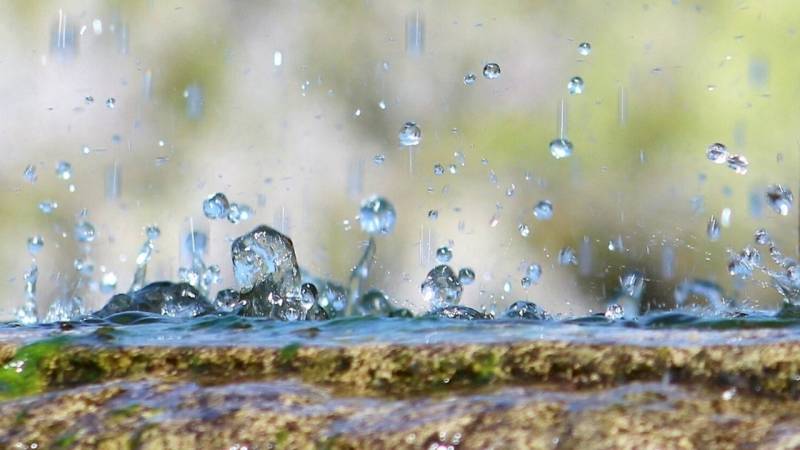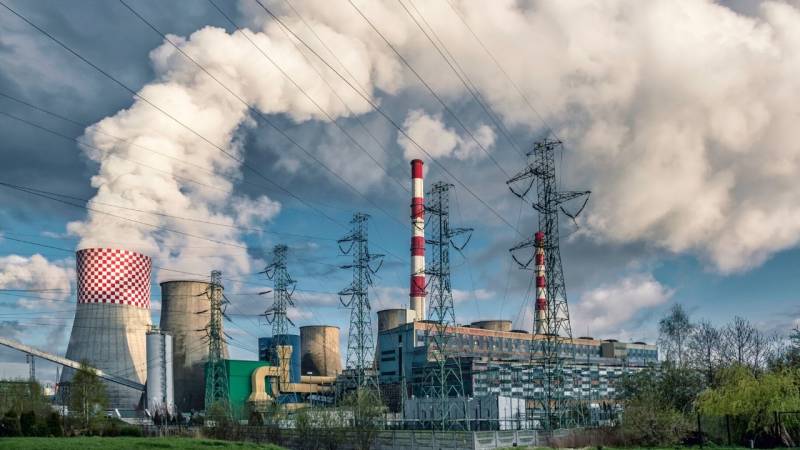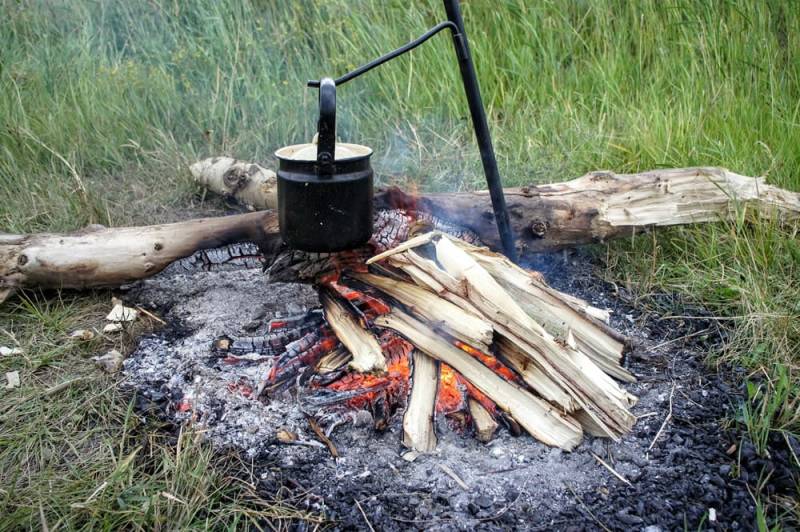
Is rainwater clean and drinkable? (Answer: mostly)
👉 The key facts from this guide
- Rainwater is often drinkable and cleaner than public water supply, but only when it comes directly from the sky.
- Do not drink rainwater in radioactive emergencies or near chemical factories and power plants.
- To make rainwater safer, filter and boil it.
- Rainwater is not distilled water, as it picks up substances on its way.
- Distilled water is not toxic, but you need to add minerals and trace elements if you drink it for a long time.
- In Germany, drinking rainwater is not legally allowed, but you can use it for gardening, washing machines, and toilet flushing.
Have you ever wondered if rainwater is drinkable?
So let's delve deeper into the topic.
Today I will show you:
- when it is not safe to drink rainwater
- when you can drink it
- what you can do to make it drinkable
Let's get started!
Can rainwater be drunk? Is rainwater clean and potable?
Rainwater can be drinkable but requires proper treatment. Before consumption, it should be filtered and disinfected to remove bacteria, viruses and other contaminants to ensure its safety.
When you should not drink rainwater
As you know, rain falls from the clouds to the earth.
On this path, the rain falls through the atmosphere, and it can happen that it becomes contaminated.
I hope you are aware that you must never drink rainwater in a radioactive emergency. Two good examples of this are the radioactive disasters in Chernobyl or Fukushima.
Furthermore, it is not a good idea to drink rainwater near chemical factories. So if you live in Ludwigshafen am Rhein (in Germany), near BASF, avoid drinking rainwater there.
But other industries, such as power plants or paper factories, also produce pollutants that accumulate in the atmosphere.
Do not drink rainwater that has run off from plants or buildings, as it absorbs toxic chemicals from the surfaces. Moreover, do not collect rainwater from puddles or in dirty containers.

Rainwater is safe to drink
The good news: Most rainwater is drinkable.
And did you know that rainwater is the daily water supply for many people?
Sure, rainwater contains occasional impurities, pollen, mold spores, and other contaminants.
But unlike many other water sources, rainwater is one of the cleanest sources. And in many countries, cleaner than public drinking water supply.
It is best to boil the rainwater before drinking it (about 3 minutes is sufficient).
Make rainwater even safer
Maybe you have already dealt with "Water in an emergency situation" collecting. Then you know that there are many ways to get water.
They all have one thing in common: You have to treat the water to make it safer and therefore drinkable.
1. Filtering: Chemicals, dust, pollen, mold, and other contaminants are removed (learn here how to build a water filter).
2. Boiling: Most pathogens are killed by boiling.

Collecting Rainwater
When collecting rainwater, I have a few tips for you.
Sure, a clean bowl or bucket is a good start.
But that can be even safer.
- Disinfect the container beforehand by cleaning it thoroughly
- Let the rainwater sit in the container for at least an hour to allow dirt to settle at the bottom
- Pass the rainwater through a coffee filter to remove the initial dirt
- Cool the rainwater on hot days to slow down the growth of microorganisms
What is acid rain?
Rainwater is naturally slightly acidic. Usually, the pH value of rainwater is around 5.5. The acidity in rainwater is due to atmospheric carbon dioxide or carbonic acid in the air.
As an example: Most tap water has a pH level between 7.0 and 8.5. Cola has a pH level between 2.0 and 3.0. Orange and apple juice have a pH level of 3.5. Coffee has a pH level of 5.0 and tea has a pH level of 5.5.
Really acidic rain occurs especially around a volcano. But I guess you're not really hanging out there.
Basically, the pH value of rain is negligible and is not relevant.
Is rainwater distilled water?
It seems so. Rainwater evaporates on the ground and rises into the sky. During evaporation, all electrolytes, minerals, trace elements, and pollutants remain on the ground. That's why rainwater appears to be distilled water.
BUT: The journey of water droplets is so long that they pick up substances from surfaces (lakes, seas, etc.) and bring them back to the clouds and then back to the Earth. These substances include dust, ash, organic substances such as spores, bacteria, and pollen. In cities, this also includes fine particulate matter.
Rainwater is therefore not distilled water.
Speaking of distilled water: The rumor that distilled water is toxic persists stubbornly, but it is false.
Basically, it is not a problem if you drink distilled water for several days.
Is distilled water harmful?
If you only drink distilled water for various weeks, you need to supply electrolytes, minerals, and trace elements.
If it doesn't go through the water, then at least through the food. That means if you consume enough food, you don't have to worry.
There are other methods:
- Use small amounts of salt and sprinkle it into the water (or saltwater from the sea)
- Sprinkle some wood ash (the white powdery residue from burned wood) on your food
- Sand, sawdust, oatmeal, or blades of grass are also suitable
For more information on re-mineralizing distilled water, take a look at my guide "How to re-mineralize distilled water?".
Are you allowed to drink rainwater (legally speaking)?
You are not allowed to drink rainwater in Germany. You are only allowed to use rainwater for watering your garden in Germany. Furthermore, you can also use rainwater for operating your washing machine and toilet flush. If you drink rainwater without permission, you are legally liable.
Summary
You now know that rainwater is drinkable (there are exceptions, of course).
Basically, when you are at a fixed location and looking for water, you are trying to do the following:
- place as many containers as possible, such as pots or plastic sheets
- then filter the rainwater
- boil the rainwater
The result: Perfectly drinkable water, straight from the clouds. Delicious and a ray of hope in any emergency situation.
Leave your opinion!
Have you ever tried rainwater? How did it taste?

Sources for the guide
- pH-Werte in einer Tabelle: https://www.blutwert.net/ph-wert/
- Die WHO zu Regenwasser: https://www.who.int/sustainable-development/health-sector/strategies/rainwater-harvesting/en/
- Zeit.de: https://www.zeit.de/2018/03/regenwasser-trinken-risiko-stimmts
- Umweltbundesamt, VERSICKERUNG UND NUTZUNG VON REGENWASSER – VORTEILE, RISIKEN, ANFORDERUNGEN: https://www.umweltbundesamt.de/sites/default/files/medien/publikation/long/2973.pdf
- https://www.wissenschaft-im-dialog.de/projekte/wieso/artikel/beitrag/ist-regenwasser-destilliertes-wasser-und-kann-man-es-trinken/

Author of the guide
Martin Gebhardt
Hey, I'm Martin. On my blog, you will learn the basics and numerous details about living in the wild. I think survival, bushcraft and the good life in nature are the keys to happiness. Find me here on Instagram or on YouTube. You can find more about my mission on the About Me page.
Was this guide helpful?
97 people found this guide helpful.
4.84 out of 5 points (101 Ratings)
Comments (0)
This post may contain affiliate links. So if you click on the links and make a purchase, I will receive a small commission at no additional cost to you. Click here, to learn more about it.


